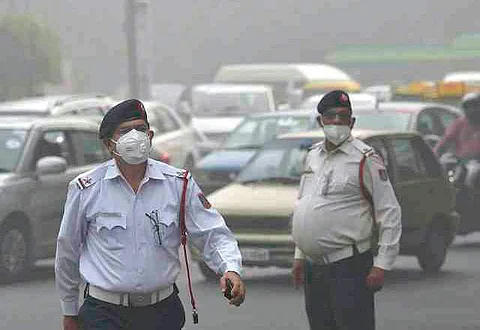

As I write this article, the Air Quality Index (AQI) in many parts of Delhi worsens to the astounding range of 800 to 990. AQI is the number periodically communicated by the government authorities to public about the quality of air, primarily focusing on ground-level ozone, particulate pollution, carbon monoxide, sulfur dioxide and other chemical substances. The Indian norm refers to 100 as the desired level (compared to, say, the London norm of 60). The All India Medical Association recently suggested that the playgrounds in schools should be closed the moment the AQI crosses 230-mark. The medical advice is also that all educational institutions should stop functioning if the AQI crosses 300.
Presumably, the authorities should seriously consider winding up all schools and colleges in Delhi, round the year! The country, which is now ranked as having the worst educational standards in the world, should close all of them—perhaps, the logic is, it would not make a difference!Who is responsible for managing the quality of the atmosphere/air in India? Is it the Cabinet, the Parliament or the Judiciary? One has not heard a single significant substantive statement from our Ministry of Environment in this regard—apparently, their only concern is to represent India in international conferences on ‘climate change’.
They have nothing to do with domestic air quality! Is Delhi Chief Minister Arvind Kejriwal responsible? In 2015, he foolishly strutted into this space, and ordered the odd-even vehicle traffic regulation, and within three months he understood that this move gave him no political mileage—he has been totally silent hitherto on the subject. Is there any authentic study, leading to suitable restrictions on traffic, crop burning, construction activities? For the long term, how is a poor country not focusing on urban public transportation, and instead encouraging private motor cars? Why is there no policy? Nobody has heard any comment from anyone in the authority. Presumably, no problem exists. Nothing is to be done; the problem will go away!
Delhi is the most polluted city in the world. It has beaten Beijing for this honour—note that Beijing has a well-ordered action plan to respond to changes in the AQI numbers. Already seven Indian cities figure in the top 20 most-polluted cities in the world—it is a question of a couple of years before Agra/Kanpur/Lucknow and others reach the international ranking! Why is there no White Paper on this subject, well-researched, well-publicised—listing the probable causative influences, with their probable contribution season-wise, a national body with representation from all agencies directly responsible and with decisive political and administrative clout. Why is no one responsible on this subject? This is abject abdication of the governance and management responsibilities—callous disregard for the welfare and health of the citizens.
In this background of an utterly inept, inert governance system, the Supreme Court banned the sale of crackers during Diwali. It was comical to note, if not outright tragic in substance, that on the most trivial grounds the Supreme Court was accused of ‘half-baked’ ill-thought-out orders, and not coming up with a ‘comprehensive’ solution and naturally of ‘overreach’. How absurd can be we to not recognise the apex court orders as a first warning shot (this should have come 10 years back), highlighting the criticality of the situation, and indirectly telling the government of the day (state and the Centre) to urgently evolve a national plan and implement it. Authentic studies have referred to the Delhi air having the same influence on the average lungs as one packet of cigarette a day.
Only very recently, scientist Stephen Hawking predicted that the earth will become a sizziling fireball in only 600 years unless humans wake up. It would lead to the end of human kind. Clearly, India apparently intends to sharply hasten the process—only the other day the Environment Ministry submitted an affidavit before the Supreme Court (in the firecrackers case) claiming there is no ‘proven connection’ between polluted atmosphere and public health! If the government of the day refuses to protect its own citizens, who will take the first step?tsrsubramanian@gmail.com